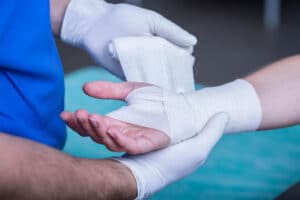By Deborah Jeanne Sergeant
 To an extent, medical professionals know how to care for wounds and ostomies; however, wound care also represents a medical specialty. Extra training and education in wound care can augment any medical professional’s resume and help segue into leadership roles.
To an extent, medical professionals know how to care for wounds and ostomies; however, wound care also represents a medical specialty. Extra training and education in wound care can augment any medical professional’s resume and help segue into leadership roles.
“It’s always nice to have something like that when you have a high population of people in the community who come home from the hospital with wounds,” said Rosa Kowalczewski, clinical director Willcare in Buffalo. The organization, owned by LHC Group, also has New York locations in Jamestown and Wellsville.
She looks for wound care certification on resumes because it’s helpful for her team and crucial for her clients.
“We have two wound care certified nurses on staff and we use them for diabetic patients and elderly,” Kowalczewski said. “We have some assisted living facilities who call on us and know that in the past, we’ve had very good results in healing difficult or ‘non-healing’ wounds that have lasted a year or more or continued to have an infection. They call us for those nurses. It’s a big asset to have someone with wound care certification.”
She believes it’s “absolutely worthwhile” for care providers to seek the extra training because of the employment advantages, though it is costly.
The Cleveland Clinic’s online program for wound care, ostomy and continence takes about five months to complete. Some programs focus only on wound care; others include ostomy and continence because urine or feces remaining on skin for extended periods breaks down the skin.
Wound care specialists tend to serve many older adults, since their skin does not heal as quickly as younger people, and who are more likely to have conditions that raise their risk of pressure ulcers. Diabetics are also frequent patients of wound care specialists.
The Cleveland Clinic’s wound care, ostomy and incontinence program costs $6,000. Other organization such as Wound Care Institute offer online classes.
David E. Balliette, program director of The Center for Wound Care & Hyperbaric Medicine at Clifton Springs Hospital & Clinic, said that nurses and doctors with wound care certifications are preferred for his organization.
“It teaches protocols, how to work with other primary care providers, as well as the modalities and advanced therapies we use,” he said. “When that patient is done with treatment, there’s definitely a connection where the patient is thankful for how they were treated. Their case manager is their coach for the healing processes.”
He added that the extra training may mean a higher paycheck, depending upon the organization, but the real perk is that working in wound care means regular work hours, without on-call or weekend work. He thinks that wound care will continue to grow as a specialty area.
Tara Weedar, RN and clinical nurse manager Clifton Springs Hospital, said that nurses can attend weeklong classes at Healogics in Jacksonville, Florida, to receive extra wound care treatment expertise.
Weedar said that completing coursework “would open more opportunities for them to provide services to their patients. Being in a wound care center, we have all the advanced modalities they can use. With the partnership with Healogic, our success rates outstrip any other facility.”
She said the care involves assessing wounds, understanding antimicrobial treatments, knowledge of devices for pressure ulcers and dressing wounds.
“When I look for staff, I look for someone with good bedside manner,” Weedar said. “Our patients come in weekly. Being able to connect with patients is important. We not only heal their wounds but we get to know people.”
She added that anyone can learn the technical aspects of wound care, “but the soft, bedside manner skills are not replaceable.”

